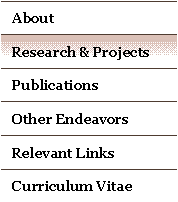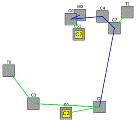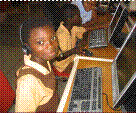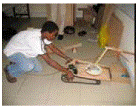|
G. Ayorkor Korsah (G. Ayorkor Mills-Tettey) |






|
Constrained Task Allocation, Scheduling & Routing |
|
Research & Projects |


|
Planning and Coordination |

|
My earlier work in task allocation looked at the simpler case where there are no constraints and a set of tasks is assigned to a set of agents in a one-to-one fashion, i.e. one agent to one task. Optimal and efficient algorithms exist to solve this problem, and I considered the case where there are changes in the cost of having an agent perform a given task, and as such, the assignment needs to be modified quickly. To this end, I developed a dynamic version of the well-known Hungarian Algorithm. This Dynamic Hungarian Algorithm is able to efficiently modify the computed task assignment. |
|
Task Assignment with Changing Costs |
|
I worked on the problem of planning and efficiently re-planning paths for a solar-powered mobile rover taking into consideration time-dependent costs and energy constraints. The resulting DD* Lite algorithm is a an efficient incremental search algorithm for problems that can capitalize on state dominance. I further introduced a framed cells approach that built on DD* Lite to plan smoother paths for the solar-powered mobile rover . The work in this area was sponsored under NASA’s Mars Technolgy Program (MTP). |
|
Path Planning |
|
Technology, Education & Development |
|
Through my work with TechBridgeWorld, I designed and spearheaded the implementation of Project Kané, a research endeavor aimed at exploring the role that technology can play in improving child literacy in developing communities. An initial pilot study and subsequent four-month-long controlled field study in Ghana investigated the viability and effectiveness of an automated reading tutor (developed by Project LISTEN) in helping urban children enhance their reading skills in English. The controlled study was conducted in collaboration with the Kofi Annan Center for Excellence in ICT in Accra. The study yielded quantitative data suggesting that automated tutoring can be useful for children in this setting. These studies and an additional preliminary pilot study conducted in Zambia by colleagues, yielded useful qualitative observations regarding the feasibility of applying technology solutions to the challenge of enhancing child literacy in developing communities. |
|
Project Kané: Exploring the Role of Technology in Enhancing Literacy |
|
Together with my advisor and other faculty at Carnegie Mellon, I developed a partnership between Carnegie Mellon University in Pittsburgh, USA and Ashesi University in Accra, Ghana to design and implement an undergraduate introductory Robotics course targeted towards the Ghanaian context. This hands-on course, which to our knowledge is the first of its kind in Ghana, introduced students to the fields of Robotics and Artificial Intelligence and guided them to develop technical creativity by designing, building, and programming small robotic systems. |
|
Using Robotics Education to Enhance Technical Creativity |
|
My current research interests are in two main areas. One area covers combinatorial optimization problems that arise in planning and coordination for robotics. In particular, I have explored optimal constrained path planning problems, dynamic assignment problems, and my dissertation research currently focuses on constrained task allocation, scheduling and routing for teams consisting of multiple heterogeneous robots or other agents. My second main area of interest is exploring the intersection of technology, education, and development. How can technology be used a tool that enhances education and assists in the process of development? How can technology education raise up innovators and help communities play an active role in stimulating the process of development both for themselves and for others in the global community? |
|
My dissertation work focuses on the problem of task allocation, scheduling and routing for teams of heterogeneous agents (which may include robots, other vehicles, or humans), and for problem scenarios which have inter-task constraints (such as precedence, synchronization constraints) as well as location-related constraints (such as capacity constraints) that must be considered. Such problems arise in several domains including disaster response, agriculture, construction, and mining, and require the coordination of teams of robots and humans to accomplish a collection of spatially distributed tasks. I am interested in bounded optimal solution approaches to this problem, and to this end have developed an optimal branch-and-price algorithm to solve this problem. My colleagues and I are also exploring how this optimal approach can be combined with market-based approaches to handle dynamic scenarios. Our current work on developing coordination algorithms for disaster response is sponsored by the Qatar National Research Fund (QNRF). |




